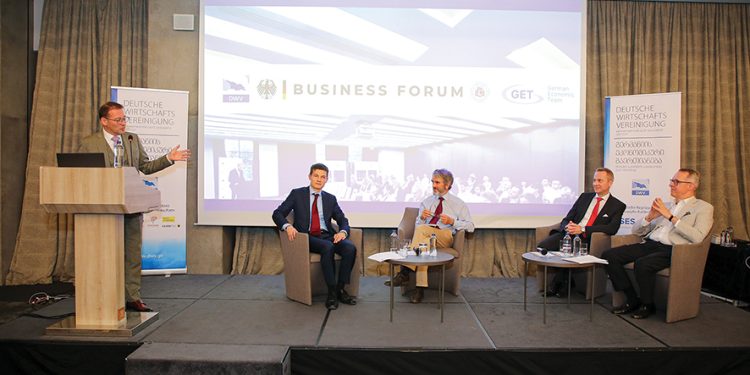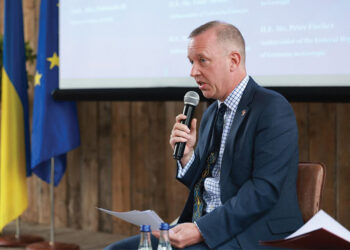On October 10, at the Pullman Tbilisi Axis Towers, a business forum was held, organized by the German Business Association (DWV), to address the economic and geopolitical consequences Georgia is facing ahead of the upcoming parliamentary elections on October 26. This election is seen as a potential turning point in the modern history of Georgia, with the country’s long-standing pro-Western course now in question due to recent political developments and legislative changes. The forum focused on understanding how these political shifts could impact Georgia’s economic future.
The forum featured prominent speakers, including the German Ambassador to Georgia, Mr. Peter Fischer; Mr. Sebastian Staske from the German Economic Team (GET); Dr. Hans Gutbrod, professor at Ilia State University; and Mr. Sascha Ternes, Chairman of the Governing Board of the German Business Association (DWV), who moderated the event. The Executive Director of the German Business Association (DWV), Thomas Kimmeswenger, also greeted the public.
In his address, Ambassador Fischer emphasized the critical nature of the upcoming elections, stating, “This is your election, not Germany’s election—you choose.” He highlighted that Georgia’s entry into the European Union would require meeting specific modern-day criteria and that historical ties alone would not secure membership. He warned that legislative moves, like the foreign influence transparency law, pose serious obstacles to Georgia’s EU aspirations, stressing that the law restricts freedoms and contradicts fundamental European principles. Ambassador Fischer also mentioned that they are sending informative letters to their citizens living in Georgia, warning them about potential political instability and advising caution in the days following the elections. While they hope everything will proceed peacefully, they are prepared for any scenario and are discussing potential risks. Ambassador Fischer underscored that while Germany and the EU desire Georgia’s success, the choice to uphold democracy and the Western course ultimately lies with Georgia.
The ambassador also referenced the 30-year cooperation between Germany and Georgia, noting that Georgia ranks fifth worldwide in per capita aid from Germany. However, he expressed concern over the current course and voiced disappointment with claims that Germany and its partners are no longer Georgia’s allies.
Sebastian Staske’s presentation provided a thorough analysis of Georgia’s economic state, addressing risks such as the national debt and the devaluation of the currency. He raised concerns about future economic stability, questioning whether Georgia would turn to Chinese loans if EU aid was frozen. He echoed the ambassador’s sentiment with a sharp remark, “Good luck with that.” Staske also discussed the tourism sector, noting the shift in tourist demographics and spending, and touched on migration challenges, pointing out the ongoing brain drain as a serious concern.
Hans Gutbrod comprehensively compared Georgia’s position on the Bertelsmann Transformation Index BTI with other countries. His data illustrated how systemic political decisions shape economic outcomes and emphasized the importance of making the right choices to improve Georgia’s economic standing. Gutbrod also highlighted structural risks in agriculture and tourism and provided real-world examples of how Georgian businesses could benefit from adapting to EU standards.
The forum concluded with a Q&A session, during which the panelists discussed potential post-election scenarios and their economic consequences. The discussion closed with a comparison of the European Union and BRICS models, where the ambassador humorously dismissed any real comparison, stating they are “as different as night and day.”
The event ended with an informal networking session, where participants had the opportunity to engage with the speakers. The German Business Association, which regularly organizes such forums for its members, once again facilitated a critical conversation on Georgia’s future, offering both insight and a call to action for the country as it stands at a crossroads.
By Sofia Bochoidze














